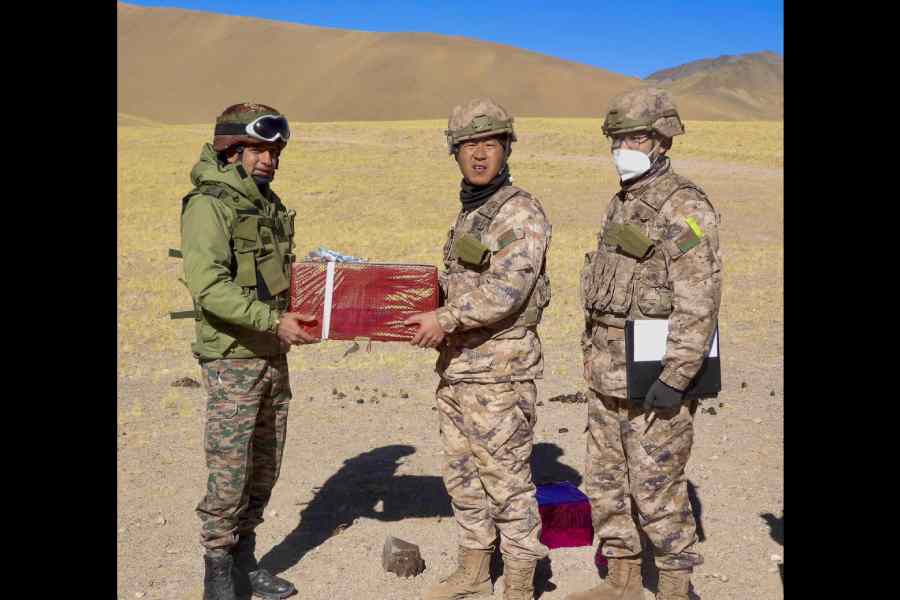The disengagement of Indian and Chinese troops near the Ladakh frontier is “almost complete”, defence minister Rajnath Singh said on Thursday, a day after Indian army sources had been quoted as saying the process had been completed.
The Chinese defence ministry on Thursday merely said the two countries’ troops were “making progress” in implementing the disengagement agreement, declining to comment on reports that the disengagement had been completed, PTI reported.
Rajnath added that India wanted to go “beyond disengagement” but must “wait a little longer”, his remark appearing to reaffirm concerns expressed by Indian veterans, who have welcomed the disengagement process but flagged the challenges of de-escalation that lie ahead.
While disengagement means restoring status quo by dismantling infrastructure and camps and pulling back troops from occupied areas, de-escalation refers to the thinning of troops and weaponry on one’s own side of the border to reduce the possibility and intensity of future conflict.
Sources said that physical verification after the disengagement was in its final stages but the new patrolling modalities were yet to be finalised.
Rajnath’s comments came before the media in Tezpur, Assam, from where he virtually inaugurated the Major Ralengnao “Bob” Khathing Museum of Valour in Tawang, Arunachal Pradesh.
He said that diplomatic and military talks between the two countries had led to a “broad consensus”.
“The consensus includes the rights of patrolling and grazing in traditional areas. Based on this consensus, the process of disengagement is almost complete. Our efforts will be to take the matter beyond disengagement, but for that, we will have to wait a little longer.”
India had last week announced it had reached a patrolling arrangement with China “leading to disengagement” in Ladakh. The announcement came hours before Prime Minister Narendra Modi met the Chinese President on the sidelines of the Brics summit in Kazan, Russia.
A day later, India’s foreign ministry clarified that the latest agreement applied only to the Depsang Plains and Demchock, and not to the other transgression points where demilitarised “buffer zones” were earlier created by altering the status quo.
There has been “partial” Chinese disengagement from the Galwan Valley, the south and north banks of the Pangong Lake, Hot Springs and Gogra, but at the price of Indian troops retreating inside Indian territory by an equal distance while the Chinese still remained within India-claimed lines.
While paying tribute to Major Bob Khathing’s contributions to the integration of the Northeast and national security, Rajnath said: “Khathing not only led the peaceful integration of Tawang into India but also established essential military and security frameworks....”
The defence minister also unveiled a statue of Vallabhbhai Patel, whose birth anniversary was celebrated on Thursday at Tawang. Rajnath could not travel to Tawang because of bad weather.
Diwali sweets
Indian and Chinese troops exchanged sweets on Diwali at several border points across the LAC in Ladakh and the eastern sector.
Sources said the exchange of sweets took place at five “border personnel meeting” points: Chushul Maldo and Daulat Beg Oldi In Ladakh, Banchha and Bumla in Arunachal Pradesh, and Nathulain Sikkim.
Commenting for the first time after last week’s disengagement agreement, Chinese defence ministry spokesperson Zhang Xiaogang told a media briefing that “China and India have reached resolutions on the issues concerning the border areas through diplomatic and military channels”, PTI reported.
“The frontline troops of the two militaries are making progress in implementing resolutions in an orderly manner,” Zhang said, reiterating the Chinese foreign ministry’s remarks of Wednesday.
Zhang declined to comment on reports that said both countries’ troops had completed the disengagement at Demchok and the Depsang Plains and that patrolling was set to start soon at these points.
“On this question, I have no more information to offer,” Zhang said.











